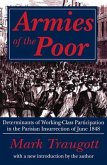- Broschiertes Buch
- Merkliste
- Auf die Merkliste
- Bewerten Bewerten
- Teilen
- Produkt teilen
- Produkterinnerung
- Produkterinnerung
Tocqueville was not only an active participant in the French Revolution of 1848, he was also a deeply perceptive observer with a detached attitude of mind
Andere Kunden interessierten sich auch für
![Armies of the Poor Armies of the Poor]() Mark TraugottArmies of the Poor63,99 €
Mark TraugottArmies of the Poor63,99 €![Aspects of Contemporary France Aspects of Contemporary France]() Sheila PerryAspects of Contemporary France31,99 €
Sheila PerryAspects of Contemporary France31,99 €![The History of the Island of Dominica The History of the Island of Dominica]() Thomas AtwoodThe History of the Island of Dominica63,99 €
Thomas AtwoodThe History of the Island of Dominica63,99 €![Women and Politics in France 1958-2000 Women and Politics in France 1958-2000]() Gill AllwoodWomen and Politics in France 1958-200056,99 €
Gill AllwoodWomen and Politics in France 1958-200056,99 €![Britain in the Age of the French Revolution Britain in the Age of the French Revolution]() Jennifer MoriBritain in the Age of the French Revolution73,99 €
Jennifer MoriBritain in the Age of the French Revolution73,99 €![Revival Revival]() Hugh Noel WilliamsRevival59,99 €
Hugh Noel WilliamsRevival59,99 €![France and Women, 1789-1914 France and Women, 1789-1914]() James McMillanFrance and Women, 1789-191456,99 €
James McMillanFrance and Women, 1789-191456,99 €-
-
-
Tocqueville was not only an active participant in the French Revolution of 1848, he was also a deeply perceptive observer with a detached attitude of mind
Hinweis: Dieser Artikel kann nur an eine deutsche Lieferadresse ausgeliefert werden.
Hinweis: Dieser Artikel kann nur an eine deutsche Lieferadresse ausgeliefert werden.
Produktdetails
- Produktdetails
- Verlag: Routledge
- Seitenzahl: 374
- Erscheinungstermin: 31. Januar 1987
- Englisch
- Abmessung: 229mm x 152mm x 20mm
- Gewicht: 541g
- ISBN-13: 9780887386589
- ISBN-10: 088738658X
- Artikelnr.: 21607604
- Herstellerkennzeichnung
- Libri GmbH
- Europaallee 1
- 36244 Bad Hersfeld
- gpsr@libri.de
- Verlag: Routledge
- Seitenzahl: 374
- Erscheinungstermin: 31. Januar 1987
- Englisch
- Abmessung: 229mm x 152mm x 20mm
- Gewicht: 541g
- ISBN-13: 9780887386589
- ISBN-10: 088738658X
- Artikelnr.: 21607604
- Herstellerkennzeichnung
- Libri GmbH
- Europaallee 1
- 36244 Bad Hersfeld
- gpsr@libri.de
Alexis de Tocqueville was a French political thinker and historian, born in 1805, whose work profoundly influenced discussions on democracy and society. He studied law in his youth, becoming an insightful observer of social structures and political dynamics. His keen intellect led him to travel to America, where he analyzed the democratic system and its effects on the citizenry.During his travels in the United States, Tocqueville meticulously documented his observations, resulting in the seminal work Democracy in America. This text explored how democracy shaped American values, governance, and society, offering perspectives that were revolutionary for European audiences. His ideas on the balance between liberty and equality remain influential in political theory today.Tocqueville continued to be active in political life in France, serving as Minister of Foreign Affairs in 1849. Despite his conservative background, he advocated for reforms and social justice, especially concerning Algeria. His writings on democracy, governance, and freedom continue to inspire, marking him as one of the foremost political thinkers of the 19th century.
Written in July 1850, at Tocqueville; 1: Origin and Character of these
Recollections - General aspects of the period preceding the Revolution of
1848-First symptoms of the Revolution; 2: The Banquets - Sense of security
entertained by the Government - Anxiety of the Leaders of the Opposition -
Arraignment of Ministers; 3: Troubles of the 22nd February - The Sitting of
the 23rd - The New Ministry - Opinions of M. Dufaure and M. de Beaumont; 4:
The 24th February - The Ministers' Plan of Resistance - The National Guard
- General Redeau; 5: The Sitting of the Chamber - the Duchess of Orleans -
The Provisional Government; Everything contained in this notebook (that is
chapters 1 to 11 inclusive) was written at odd moments at Sorrento in
November and December 1850 and in January, February and March 1851; 1: My
view of the reasons for the events of the 24th February, and my thoughts
concerning its effects for the future; 2: Paris the day after the 24th
February, and the days that followed-Socialist character of the new
revolution; 3: Uncertainty of the members of the old Parliament about what
attitude to adopt-My own reflections about what I ought to do and the
resolutions I made; 4: My candidature in the department of La Manche -
Characteristics of that province - The general election; 5: First meeting
of the Constituent Assembly - Appearance of that Assembly; 6: My relations
with Lamartine-His Subterfuges; 7: The 15th May; 8: The Festival of Concord
and the eve of the June Days; 9: The June Days; 10: The end of the June
Days 1; 11 1: The Drafting Committee for the Constitution 2; My Term of
Office; 1: My return to France-Formation of the cabinet; 2: Composition of
the Cabinet-Its conduct down to the attempted insurrection of the 13th
June; 3: Our domestic policy-Quarrels within the Cabinet-Difficulties in
its relations with the Majority and the President; 4: Foreign affairs
Recollections - General aspects of the period preceding the Revolution of
1848-First symptoms of the Revolution; 2: The Banquets - Sense of security
entertained by the Government - Anxiety of the Leaders of the Opposition -
Arraignment of Ministers; 3: Troubles of the 22nd February - The Sitting of
the 23rd - The New Ministry - Opinions of M. Dufaure and M. de Beaumont; 4:
The 24th February - The Ministers' Plan of Resistance - The National Guard
- General Redeau; 5: The Sitting of the Chamber - the Duchess of Orleans -
The Provisional Government; Everything contained in this notebook (that is
chapters 1 to 11 inclusive) was written at odd moments at Sorrento in
November and December 1850 and in January, February and March 1851; 1: My
view of the reasons for the events of the 24th February, and my thoughts
concerning its effects for the future; 2: Paris the day after the 24th
February, and the days that followed-Socialist character of the new
revolution; 3: Uncertainty of the members of the old Parliament about what
attitude to adopt-My own reflections about what I ought to do and the
resolutions I made; 4: My candidature in the department of La Manche -
Characteristics of that province - The general election; 5: First meeting
of the Constituent Assembly - Appearance of that Assembly; 6: My relations
with Lamartine-His Subterfuges; 7: The 15th May; 8: The Festival of Concord
and the eve of the June Days; 9: The June Days; 10: The end of the June
Days 1; 11 1: The Drafting Committee for the Constitution 2; My Term of
Office; 1: My return to France-Formation of the cabinet; 2: Composition of
the Cabinet-Its conduct down to the attempted insurrection of the 13th
June; 3: Our domestic policy-Quarrels within the Cabinet-Difficulties in
its relations with the Majority and the President; 4: Foreign affairs
Written in July 1850, at Tocqueville; 1: Origin and Character of these
Recollections - General aspects of the period preceding the Revolution of
1848-First symptoms of the Revolution; 2: The Banquets - Sense of security
entertained by the Government - Anxiety of the Leaders of the Opposition -
Arraignment of Ministers; 3: Troubles of the 22nd February - The Sitting of
the 23rd - The New Ministry - Opinions of M. Dufaure and M. de Beaumont; 4:
The 24th February - The Ministers' Plan of Resistance - The National Guard
- General Redeau; 5: The Sitting of the Chamber - the Duchess of Orleans -
The Provisional Government; Everything contained in this notebook (that is
chapters 1 to 11 inclusive) was written at odd moments at Sorrento in
November and December 1850 and in January, February and March 1851; 1: My
view of the reasons for the events of the 24th February, and my thoughts
concerning its effects for the future; 2: Paris the day after the 24th
February, and the days that followed-Socialist character of the new
revolution; 3: Uncertainty of the members of the old Parliament about what
attitude to adopt-My own reflections about what I ought to do and the
resolutions I made; 4: My candidature in the department of La Manche -
Characteristics of that province - The general election; 5: First meeting
of the Constituent Assembly - Appearance of that Assembly; 6: My relations
with Lamartine-His Subterfuges; 7: The 15th May; 8: The Festival of Concord
and the eve of the June Days; 9: The June Days; 10: The end of the June
Days 1; 11 1: The Drafting Committee for the Constitution 2; My Term of
Office; 1: My return to France-Formation of the cabinet; 2: Composition of
the Cabinet-Its conduct down to the attempted insurrection of the 13th
June; 3: Our domestic policy-Quarrels within the Cabinet-Difficulties in
its relations with the Majority and the President; 4: Foreign affairs
Recollections - General aspects of the period preceding the Revolution of
1848-First symptoms of the Revolution; 2: The Banquets - Sense of security
entertained by the Government - Anxiety of the Leaders of the Opposition -
Arraignment of Ministers; 3: Troubles of the 22nd February - The Sitting of
the 23rd - The New Ministry - Opinions of M. Dufaure and M. de Beaumont; 4:
The 24th February - The Ministers' Plan of Resistance - The National Guard
- General Redeau; 5: The Sitting of the Chamber - the Duchess of Orleans -
The Provisional Government; Everything contained in this notebook (that is
chapters 1 to 11 inclusive) was written at odd moments at Sorrento in
November and December 1850 and in January, February and March 1851; 1: My
view of the reasons for the events of the 24th February, and my thoughts
concerning its effects for the future; 2: Paris the day after the 24th
February, and the days that followed-Socialist character of the new
revolution; 3: Uncertainty of the members of the old Parliament about what
attitude to adopt-My own reflections about what I ought to do and the
resolutions I made; 4: My candidature in the department of La Manche -
Characteristics of that province - The general election; 5: First meeting
of the Constituent Assembly - Appearance of that Assembly; 6: My relations
with Lamartine-His Subterfuges; 7: The 15th May; 8: The Festival of Concord
and the eve of the June Days; 9: The June Days; 10: The end of the June
Days 1; 11 1: The Drafting Committee for the Constitution 2; My Term of
Office; 1: My return to France-Formation of the cabinet; 2: Composition of
the Cabinet-Its conduct down to the attempted insurrection of the 13th
June; 3: Our domestic policy-Quarrels within the Cabinet-Difficulties in
its relations with the Majority and the President; 4: Foreign affairs








